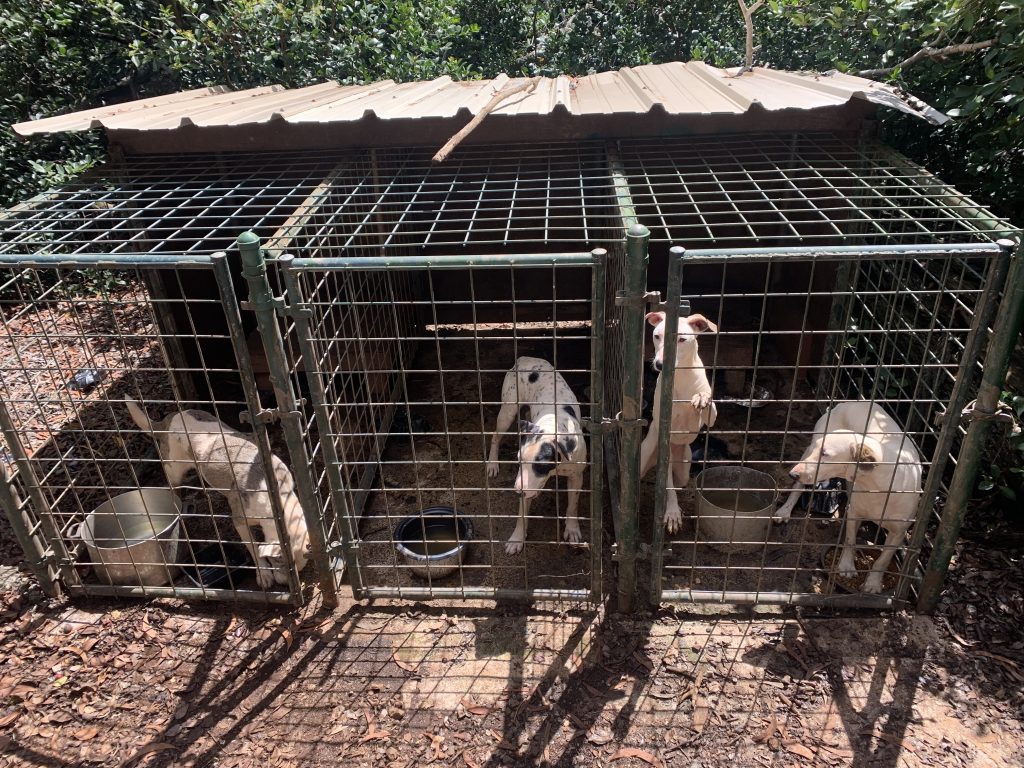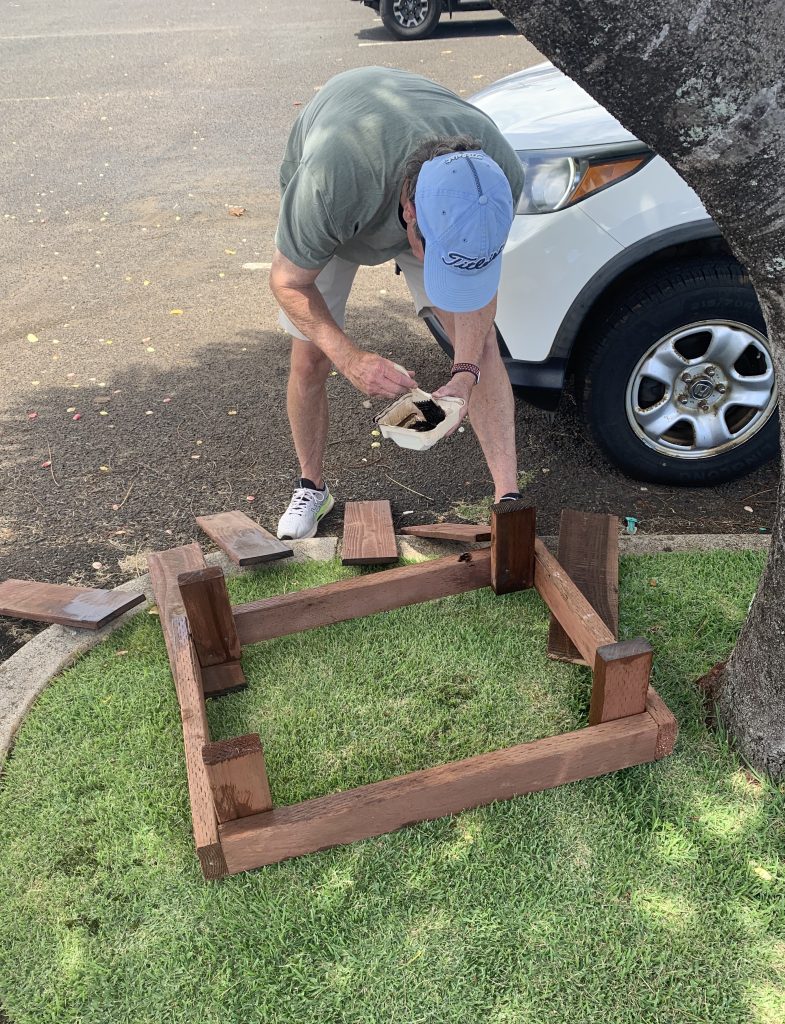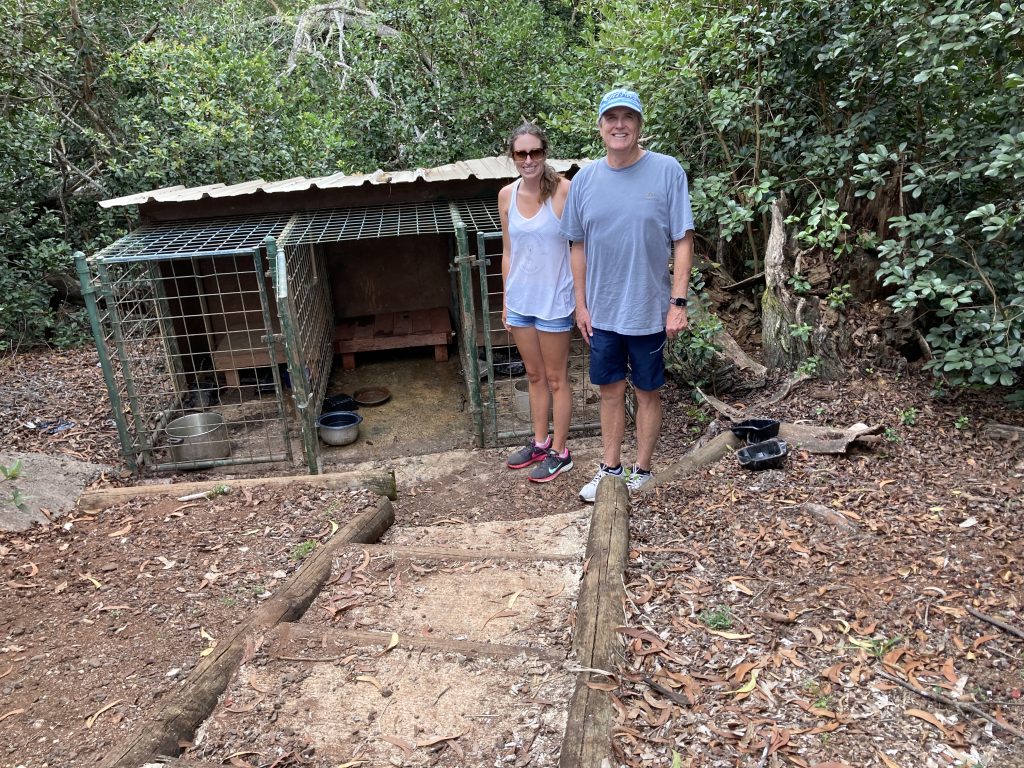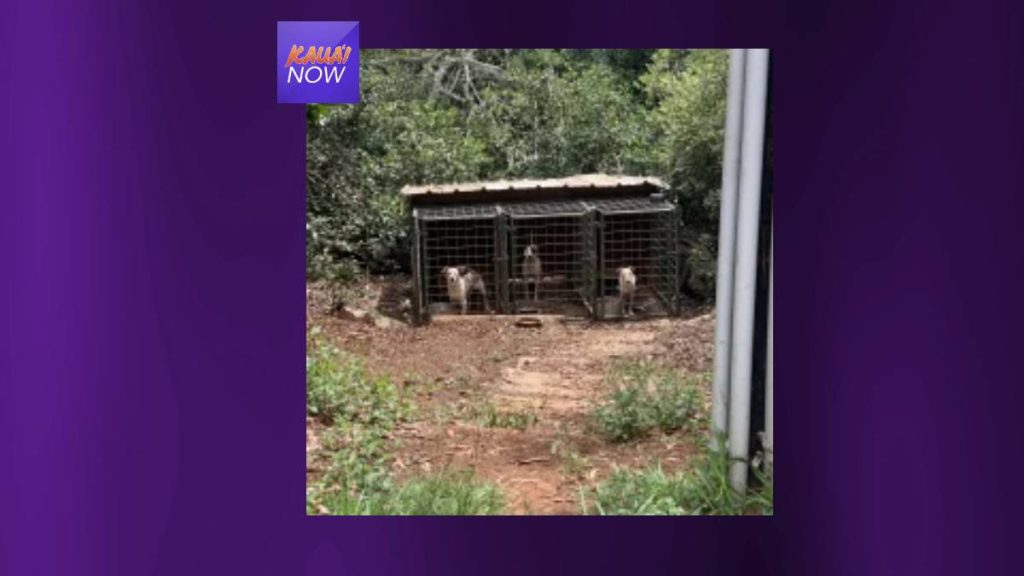Deprecated: stripslashes(): Passing null to parameter #1 ($string) of type string is deprecated in /mnt/efs/html/wp-content/plugins/template-scripts/src/AuthorBios/Frontend.php on line 129
Tourists build platform for Kennel for Lost Hunting Dogs in Kōke‘e
Ashley Jacobs and her parents came to Kaua‘i to hike and enjoy the island, but a disturbing encounter added a new activity to their vacation itinerary: fixing a kennel for lost hunting dogs.
“Most of our vacations end up being about dogs in need — and trying to do our small part to make things even just a little bit better,” 34-year-old Jacobs said.

During this trip to the Garden Isle in mid-September, the family from Newport Beach, Calif., was descending Waimea Canyon Drive after a hike when they decided to stop at the hunter check-in station to see if there were any animals in the kennels for lost hunting dogs who might need water and treats.
Although the chainlink cages that sit at the bottom of a rugged staircase cannot be seen from the road, Jacobs knew they were there from previous trips. She also knew the station often is unmanned.
The family found three dirty white hunting dogs without fresh water.
These enclosures at the station operated by the state Department of Land and Natural Resources’ Division of Forestry and Wildlife were created as a place for lost hunting dogs to be put temporarily until being claimed by their owners, who hunt for feral pigs, feral goats and black-tail deer. But now, the kennels also have become a place where people have put abandoned dogs.
Jacobs said they tried to provide the three dogs with water from an automatic water pump system just behind the cages, but there was no nob to turn the water on and off.
The thirsty dogs eagerly waited as the family filled up three-inch high water bowls from their own supply.
The family also noticed the middle kennel was missing a platform that prevents the animals from having to sit in puddling rain or their own excrement.
While it’s “emotional to see” the dogs in such bad conditions, Jacobs said it really hits home to “smell the horrific stench they endure, sometimes for days.”
As the family drove to their Poʻipū timeshare 34 miles away, they kept thinking about the lack of care and compassion for the three dogs. They returned to the hunting check-in station two days later to find the three dogs still there. But now, a fourth dog was put in one of the cages.
Jacobs has a special affinity for the dogs who end up in the hunting check-in station enclosures. She found out about their existence during her time volunteering for the Kauaʻi Humane Society from 2018 to 2020. She helped transfer shelter dogs to the mainland, and many came from the kennels at Kōkeʻe.
Much of her volunteer work was done remotely. She signed up new transfer partners, pitched animals for transfer and coordinated flights.
Jacobs fell in love with Elsie, one of the dogs from Kōkeʻe that she was transferring to the mainland. In 2020, she adopted the Airedale Terrier/Pharaoh Hound Mix mix who had hookworms. Elsie also had bad hips, likely caused by her days running through Waimea Canyon as a hunting dog. Now Elise is about eight years old.
Elsie was the inspiration for Jabobs to launch Diamond’s Friends Pet Rescue in California in 2021. The no-kill shelter is an entirely foster-based program.
In Kauaʻi, Jacobs wanted to get to work on fixing the middle kennel, but first had to figure out whose approval they needed.
The kennels are intended to be a hunter lost-dog reclaim location, governed by the honor system. Dogs that have been placed in the kennels can be reclaimed at any time.
A Department of Land and Natural Resources’ spokesperson said it was the only lost and found kennel for lost hunting dogs on Kaua’i.
When the dogs in the kennels are not claimed, Kaua‘i Humane Society officials said it learns about them from hikers and other concerned people. Field officers are sent to the kennels to retrieve the dogs and bring them to the shelter, where they will receive food, water and care.
“The humane officer leaves an invoice on the hunter check-in station bulletin board detailing the description and defining characteristics of all the dogs that are taken to the shelter,” said Nicole Schafer Crane, executive director of the Kaua‘i Humane Society.
The dogs that are picked up from the kennels are put on a 48-hour stray holding period for their owners to claim they. If they are not claimed, the animals are evaluated and put up for adoption. That’s what happened to the first three dogs found by Ashley and her family. They were named Julio, Raindrop and Droopy, and are now looking for forever homes.
The fourth dog found in the kennel, a female Catahoula mix, was claimed by its owner, Ashley said.
But now the dogs showing up most regularly in these kennels are not the traditional hunting breeds, like the Chihuahua. And, too often, they are puppies, Schafer Crane said.
On Sept. 13, Ashley’s family spent $120 on supplies to build a small wooden platform, about six inches high, in the Home Depot parking lot in Līhu‘e. Curious onlookers cheered them on when they heard about the dogs’ plight.
The family ascended the switchback mountain road again to install the platform.
“Our footage truly doesn’t do it justice and I can’t even come up with the words to adequately describe it,” she said. “I couldn’t spend more than 30 seconds at a time in the kennel cleaning it out and placing the platform in because it smelled so bad. To have to live in those conditions for days … I can’t even imagine.
Sponsored Content
Notice: Function the_widget was called incorrectly. Widgets need to be registered using
register_widget(), before they can be displayed. Please see Debugging in WordPress for more information. (This message was added in version 4.9.0.) in /mnt/efs/html/wp-includes/functions.php on line 6114







